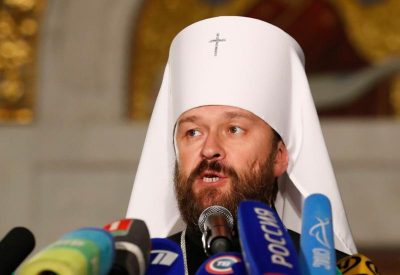
Metropolitan Hilarion of Volokolamsk, head of external relations for the Russian Orthodox Church, speaks during an Oct. 15 news conference in Minsk, Belarus. He announced the Russian Orthodox Church was severing ties with the Ecumenical Patriarchate of Constantinople. (CNS photo/Vasily Fedosenko, Reuters)
UPDATED – WASHINGTON (CNS) — The Russian Orthodox Church’s decision to sever ties with the Ecumenical Patriarchate of Constantinople will affect ecumenical dialogue, but long-term implications remain unknown.
Paulist Father Ron Roberson, associate director of the U.S. bishops’ Secretariat of Ecumenical and Interreligious Affairs, said the split reveals disagreements on some “pretty significant issues” among more than a dozen Orthodox churches.
At issue is the role of the ecumenical patriarch in the Orthodox Church. The patriarch — currently Patriarch Bartholomew of Constantinople — has always been recognized as first among equals, with the authority to organize pan-Orthodox activities like international dialogue with the Catholics.
However, Russian Orthodox Church leaders do not believe Patriarch Bartholomew has the authority to interfere in the internal affairs of individual Orthodox churches. They say that is what he did when he granted canonical recognition to two independent Ukrainian Orthodox churches.
[hotblock]
“It could be the beginning of a schism that would be long-lasting” if others follow the lead of Moscow, Father Roberson told Catholic News Service Oct. 16, the day after the decision was announced.
For instance, he said, the Serbian Orthodox Church has been supportive of Moscow’s position.
“The question is, will they follow?” he asked. “Can they (Serbians) be in communion with Constantinople and Moscow at the same time, even if (Moscow and Constantinople) are not in communion with each other?”
It is “unknown what the implications will be,” he said.
Father Roberson, who has written and updated “The Eastern Christian Churches: A Brief Survey,” referred to a similar dispute in 1996 over the Orthodox in Estonia, a former Soviet Republic. The ecumenical patriarch reconstituted a church there over the wishes of the Russian Orthodox Church. In the end, he said, they agreed that Estonia would have a church under Constantinople and a diocese under the Moscow Patriarchate.
In Ukraine, for decades there have been three Orthodox churches: two self-declared autocephalous, or independent, and not considered canonical by the other Orthodox churches. The Ukrainian Orthodox Church in communion with the Moscow Patriarchate was considered canonical.
[tower]
Earlier in October, in an effort to unify the Orthodox in Ukraine, the ecumenical patriarchate’s synod recognized both independent churches as canonical churches and reinstated the heads of both as bishops in good standing.
The Ukrainian Orthodox Church-Moscow Patriarchate has said it has no desire to be independent from Moscow. Some people believe some of that church’s bishops would go to the independent churches, Father Roberson said, adding, “That’s pure speculation at this point.”
In severing ties with Constantinople, Moscow said it would not participate in any international dialogues if the co-chair is a bishop of the ecumenical patriarchate.
“If Moscow and Constantinople will not sit down at the same table, then any theological dialogue would be with some of the Orthodox churches, not all of them,” Father Roberson said. “If the Russians are missing, that is something like half of the faithful in the Orthodox world, which is very significant.”
Calls for a single church, independent of Russian jurisdiction intensified after Russia’s 2014 annexation of Crimea and intervention in eastern Ukraine.
Ukrainian President Petro Poroshenko, who has backed calls for an independent church, pledged Oct. 14 that his government would guarantee “full respect of religious freedom for believers of all denominations.”
However, he warned against Russian attempts to “fuel a religious war” by encouraging violence at Orthodox sites and said Patriarch Bartholomew had now confirmed “clearly and unequivocally the Russian Orthodox church has no canonical title to Orthodoxy in Ukraine.”
“Ukraine never was and never will be a canonical territory of the Russian church,” Poroshenko told a Sunday prayer service in Kiev’s St. Sophia Square.
***
Contributing to this story was Jonathan Luxmoore in Warsaw.
PREVIOUS: Houston panel explores why people migrate to U.S.
NEXT: Indiana attorney general asks high court to reverse block on abortion law



Share this story